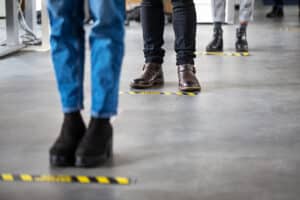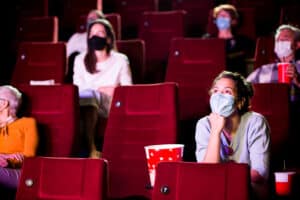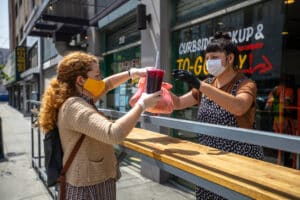For the immediate future, social distancing is the norm, at least for those of us who want to stay healthy. But “social distancing” is an inexact term. What does “social distancing” really mean in relation to our behaviors and emotional needs?
Let’s break it down into two components – physical distancing and emotional distancing. Homo Sapiens is a species of expansion. People leave home to explore new lands, to search for better opportunities. We have never had any problem leaving home to strengthen our own abilities and find our own destinies. The “empty nest” syndrome is not a problem for most people! So staying at a distance from each other, as individuals, is a small problem. It is an attitude we can decide to have. The choice is ours to make, whether it’s a big deal or a small inconvenience.
When our daughter was born in 1982, she had 3 days to live. She was transferred from a regional hospital to a children’s hospital where she underwent immediate surgery to remove 1/3 of her small intestines, the parts that were incompletely formed. I stayed in my hospital recovering from a C-section. The nurses were worried that I was not overly concerned about being separated from my newborn. They didn’t understand that I knew my daughter was in the best place possible for her to make a complete recovery.
Eventually, I was discharged from the hospital and my husband and I visited her as much as possible, giving her the love and physical contact that all newborns need. The separation was temporary, the result was life-saving. Twenty-eight days later, we all went home together.
We miss the activities of everyday life that we became used to – going out to dinner once or twice a week, shopping for whatever we need whenever we want to, utilizing services such as hair salons, and not worrying too much about our employment status. We had choices. We felt balanced. Now we feel the opposite. Although what we miss are non-life threatening activities, we are not adjusting easily to change. It is to our advantage to accept that things are going to change and deal with them with a minimum of complaints. After all, acceptance leads to lower blood pressure…and longer hair, sigh… Fortunately, we are now at the point when all 50 states have begun the reopening process.
People have trouble with physical separation when it is coupled with emotional separation. In these days of coronavirus, family members are not allowed to be in close contact with their sick loved ones. Families feel helpless, out of touch, and removed from the decision-making process. There is nothing they can physically provide to aid in their loved one’s recovery. The reasons they want to visit in the hospital are all emotional reasons. They want to reassure their loved ones that they love them, care about them and are here to make sure the hospital gives them all the care they need. But the hospital needs to limit physical contact to prevent further spread of the virus between patients and between staff members.
There is no easy solution to this problem of hospital stays for loved ones. Doctors and nurses have unexpectedly added another talent to their resumes – that of grief counselor, mainly to each other! Hospitals have begun providing iPads or tablets to patients on ventilators for essential family contact, which makes the jobs of our medical personnel somewhat easier.
Those sheltering in place at home feel stressed and resentful. Families want to be with each other, not only on holidays but for normal situations. Our family had an interesting Mother’s Day – my daughter and son-in-law had breakfast on my driveway with me and lunch on the other mom’s driveway with her family. It was great to get together at a social distance for strengthening the emotional ties between generations. We hope our precautions were effective! People who complain about their rights being violated are not looking at the big picture. They can’t see past themselves to understand the priority of the common good.
Why are people so anxious to get together in large groups for activities? Blame it on our innate social nature! I was at a professional baseball game a few years ago. I marveled at how the 35,000 people in the stadium seemed to be one giant organism enjoying the game, no matter what team they were rooting for. I could have watched the game at home to know what was happening and to know which team won. But it was much more fun watching it in a big group whose enthusiasm is contagious. We want to be there to share the emotion of our team either winning or losing – two very different emotions, to be sure. Any group of fans, whether it be sports fans, theater-goers, or parade watchers will tell you the same thing. We could watch TV for information. We want to physically attend activities for the emotional participation.
We really don’t have that common emotional involvement in going out to eat. I don’t go to a nice restaurant to dine with other people. I just want to have a nice evening with the group at my table. People who dine out without respect to the distance between tables are playing roulette with their lives. Chances are you won’t get sick. But do you want to take the chance of carrying the infection to other members of your family? Your grandparents? Your grandchildren? Consider how your family members would deal with your illness…would you put them through the agony of watching you slowly, or quickly, die? If you don’t care about yourself, consider how they would feel if you got sick. What would they do without you?
Will we ever get back to normal? What does the future hold? Sorry, I don’t have a crystal ball to foretell the future. My only comment is: in order to enjoy whatever the future has in store for us, we must be alive. Staying alive should be our number one goal. All other social decisions should be based on achieving this goal. And if it takes a bit of sacrifice to do it, then so be it. Good luck to all of us in finding patience, love, compassion, faith, and common sense in this challenging time.









